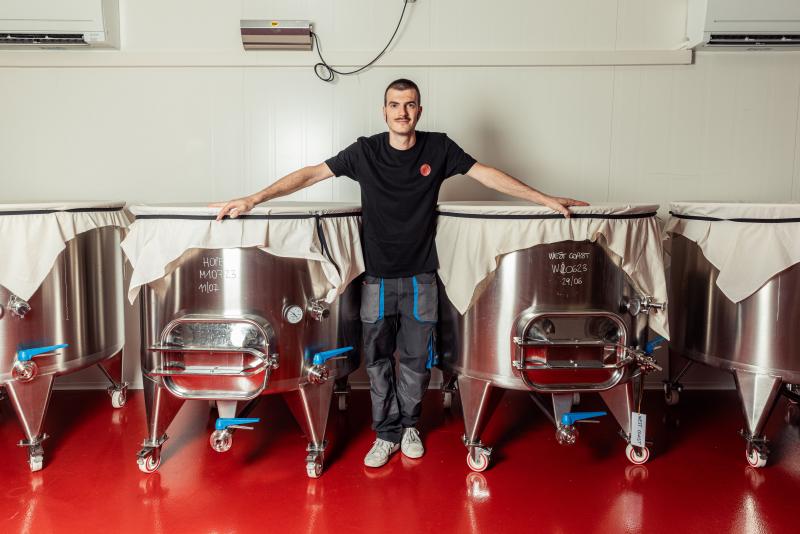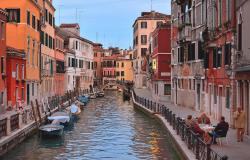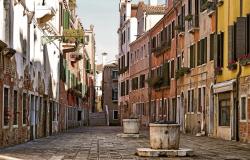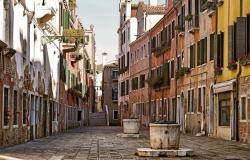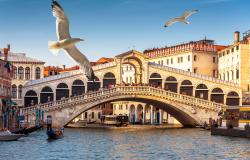Kombucha — that acerbic, slightly bubbly drink — has, in recent years, transcended its obscure origins and niche market to become an increasingly fashionable beverage, especially among health-conscious youth as an alternative to alcohol, caffeine or energy drinks. (Lady Gaga and Kim Kardashian are just two of the celebs who have recently been snapped nursing a bottle of the fizzy stuff.)
While kombucha — whose origins can be traced back to pre-modern China — is now an established beverage in much of North America and Europe, it remains a rarity in Italy, a country famous and still somewhat proud of its skepticism toward foreign food and drink.
But as the younger generation becomes ever more curious about embracing culinary imports such as bubble tea, avocado toast and poke bowls, is the moment right for kombucha to break through?
A “magical elixir”
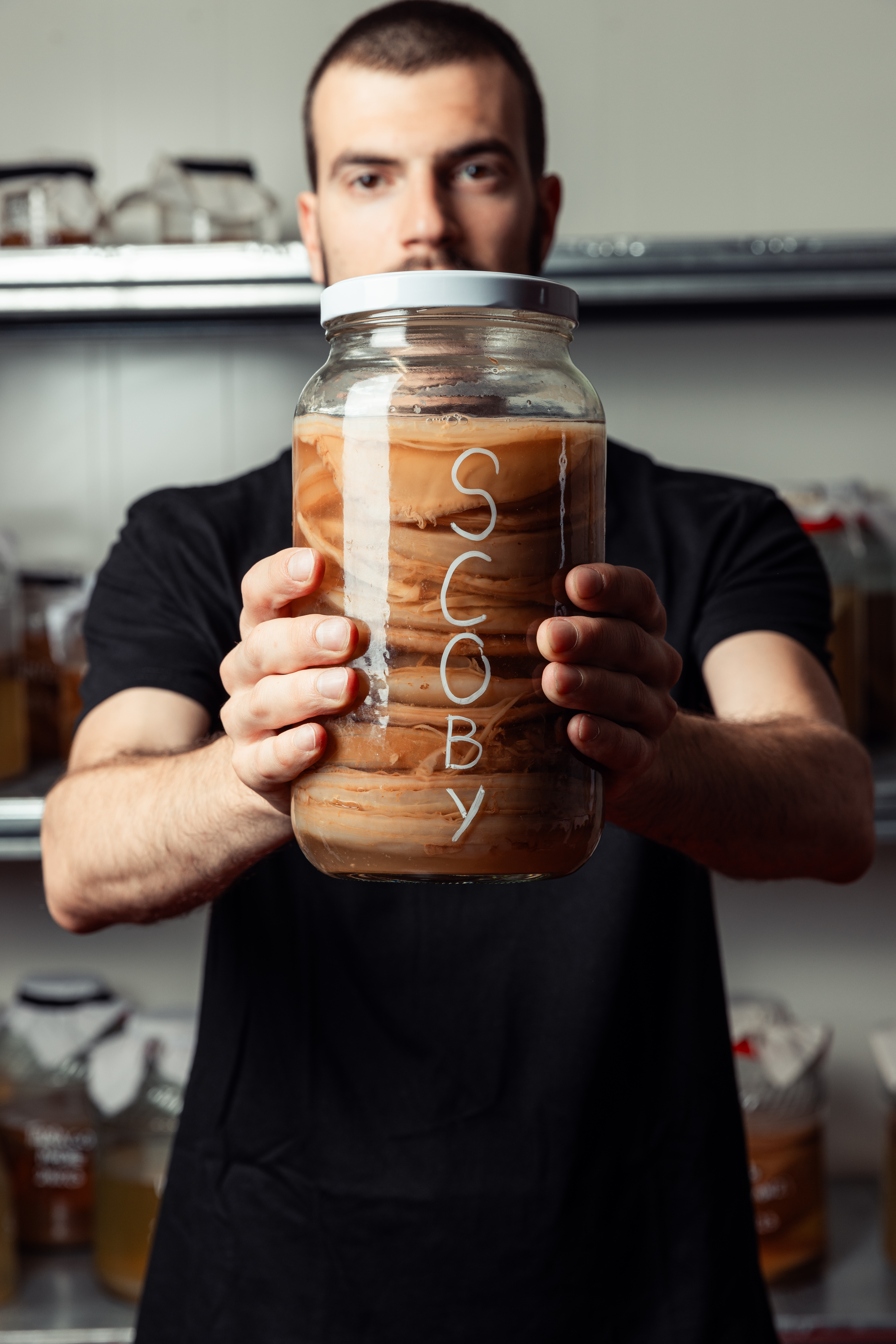
Stefano Zamboni seems to think so. The young founder and head brewer of Legend Kombucha, established in 2020 in his native Verona, Stefano discovered kombucha in 2018 while visiting his cousin in California.
“She gave me a sip when I was sick and it made me feel better,” Stefano tells me. “I was like, ‘What’s this magical elixir?’ Everyone in California seemed to be drinking it.”
Intrigued, Stefano began visiting kombucha producers around the state, charming his way into factories to gain some hands-on brewing experience. He returned to Italy, where he spent months consulting with biology professors and fermentation experts until he felt confident enough to open his own brewery.
“At the time, there was no kombucha scene in Italy. Just opening the brewery was a struggle in itself because none of the food and drink authorities had even heard of the stuff,” Stefano tells me. “We started small, attracting the interest of a few alternative bars in Verona that were looking for new products and willing to take a chance.”
The work of convincing new vendors and marketing is far from the only kombucha challenge; the fermentation process itself is delicate and complex, involving a mixture of live bacteria and yeast, a symbiosis known as “scoby.” It’s given kombucha the slightly off-putting nickname of “tea fungus.”
“[Kombucha] is essentially a living community of bacteria and yeast, working together in a synergetic way, transforming and enriching food with its properties,” Stefano tells me. “This idea of community, of diverse entities working toward a common goal, is something I find also relates to how I run my brewery.”
Kombucha in the Italian wild
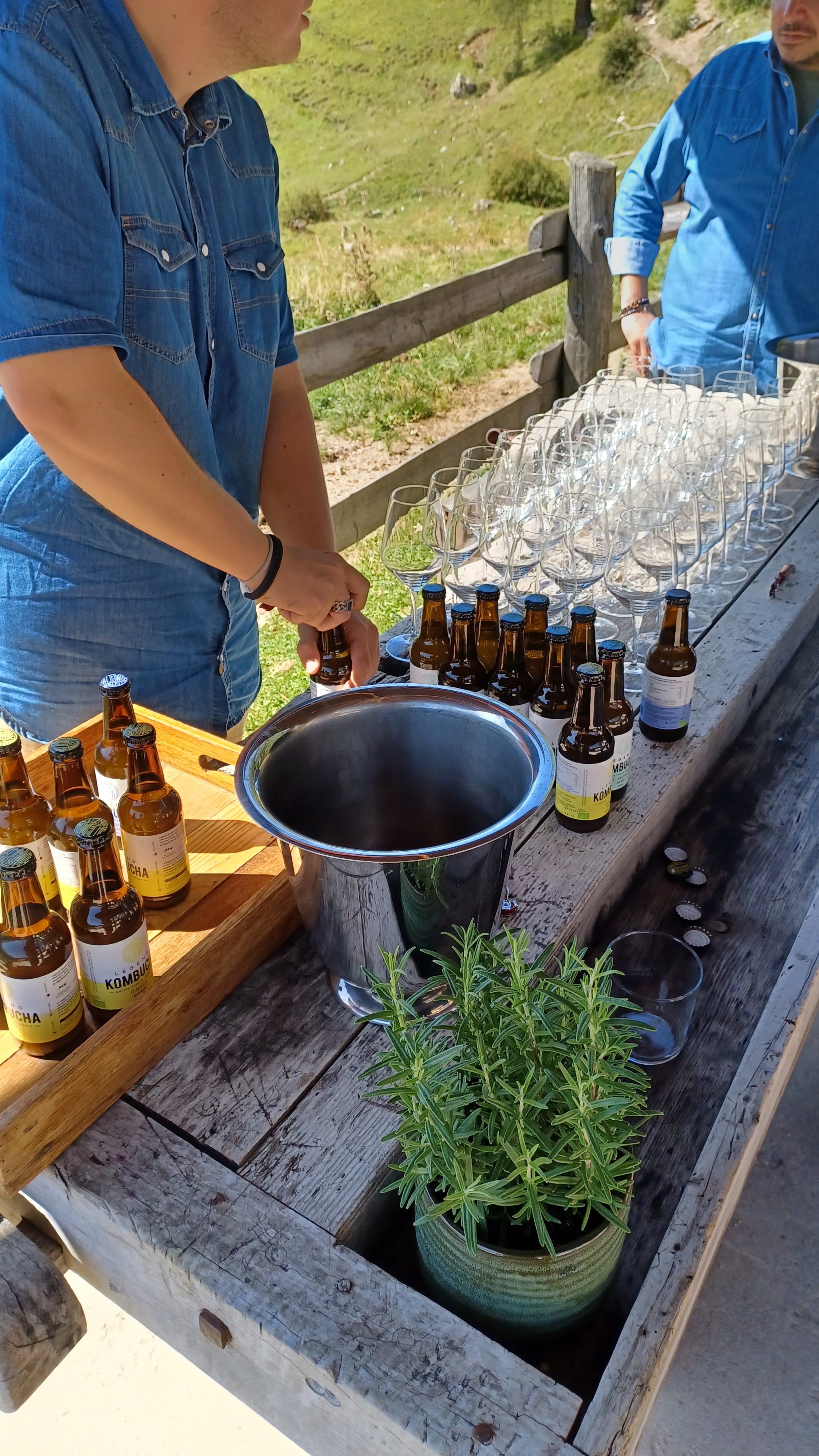
Five years on from his conversion to “kombuchanity” in California, I meet Stefano at a mountain refuge in the rarefied plains overlooking Cortina d’Ampezzo. The occasion is Genesis, a recurring event held in the Venetian Dolomites, fusing Italian nature, culture and cuisine through a philosophy based on “a return to origins.” A small community of international foodies, adventurers and spiritual types is formed over the course of the retreat-like weekend as participants sleep, eat and enjoy a range of group activities together.
At the helm of it all are chef Riccardo Gaspari and maître d’ Ludovica Rubbini, the husband and wife duo behind the Michelin-starred SanBrite restaurant in Cortina d’Ampezzo (and its accompanying agriturismo, El Brite de Larieto).
Though main sponsors of Genesis included more conventional Italian culinary heavyweights — Illy, Ambrosoli and Felicetti — Stefano and Legend Kombucha were invited, too, reflecting the open-mindedness of the organizers.
“Riccardo and Ludovica had already started offering kombucha at SanBrite and I was attracted to their philosophy of nature and regeneration, which aligns with my own philosophy for kombucha,” Stefano says.
But the culinary power couple’s interest isn’t a one-off; it perhaps hints at larger cultural shifts to come.
“The scene has changed a lot. When I started, I only had three resellers in Italy,” says Stefano. “[These vendors] really had to push it hard, even for free. But now people are specifically asking for it.”
An alternative drink for a jittery generation

At least part of what’s bolstered the interest in kombucha is its versatility; Stefano’s particularly effusive about this aspect. The variety of uses tops the list — kombucha works as a morning pick-me-up, energy drink or bar beverage. Then there’s the malleability factor — the drink has a natural propensity to be transformed into different flavors and timbres. And finally, there’s kombucha’s suitability for pairing with a range of dishes.
During the Genesis weekend, at a swanky SanBrite dinner overseen by chef Riccardo, a typically dour waiter-sommelier hovered throughout the evening, pairing wines with the increasingly idiosyncratic courses coming out of the kitchen. But as someone who generally doesn’t drink, I gravitated toward Stefano, who’d gladly taken on the role of kombucha sommelier. The drink lacks the nocebo effect of many sodas and provided a light energy boost — but one that didn’t give me jitters or leave me with a hangover.
Stefano gets why this is appealing. “I used to drink about 12 coffees a day,” he tells me; somehow he’s still alive. “Now it’s one or two, but kombucha has largely replaced my need for coffee.”
Despite being based in Veneto, which he nonchalantly describes as “the alcoholic region of Italy,” Stefano sees the drinking habits of Italians — young Italians, in particular — quietly shifting.
“Italians love to drink, but not get drunk. They like beer, wine and amaro,” Stefano says. “But we are also drinking less and increasingly looking for alternatives to alcohol, coffee and sugary sodas. I really think kombucha could become the next big thing in Italy.”
Popping into my local boozer back in Bologna, I was surprised to see that they had recently expanded their non-alcoholic roster to include kombucha, albeit from a Vicenza-based brand called Lucky Brews. I mention this to Stefano and drolly tell him that I’ll put in a word for Legend Kombucha with the bar owner.
“Oh, don’t worry,” Stefano responds. “I’m just happy they’re selling Italian kombucha, no matter the brand.”
Ed.: The writer was a guest of the Genesis organizers; the hosted experience helped facilitate this story. Italy Magazine and its writers do not accept gifts or compensation in exchange for positive coverage.
